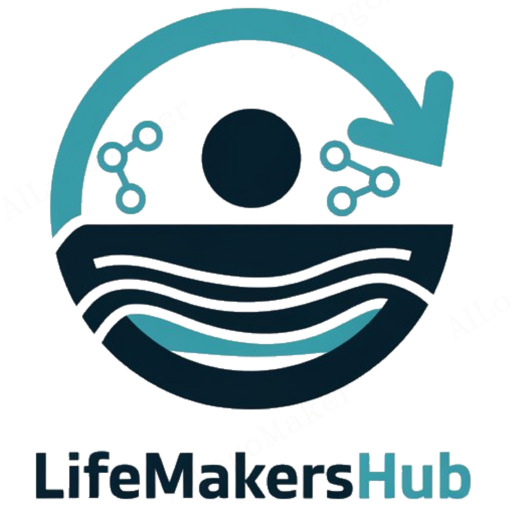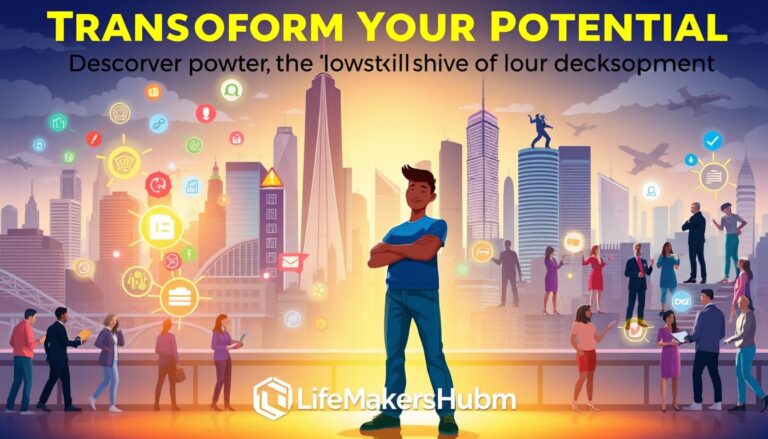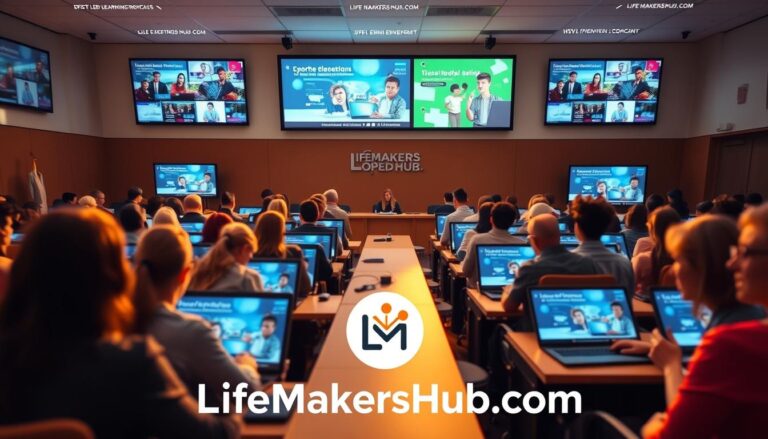LifeMakersHub
Welcome to LifeMakersHub, a dynamic platform designed to help you unlock your full potential. Here, we believe that personal growth goes beyond formal degrees. It’s about building confidence, enhancing skills, and embracing lifelong learning.
Our mission is to empower individuals through practical knowledge. Whether you’re looking to boost your career or improve daily habits, we provide tools to foster critical thinking and resilience. Education is not just a process—it’s a journey of transformation1.
By combining formal and informal learning, LifeMakersHub helps you develop essential skills like communication and leadership. Every minute invested here contributes to your overall development, creating opportunities for meaningful change2.
Key Takeaways
- LifeMakersHub focuses on personal growth and skill enhancement.
- Education fosters critical thinking and resilience.
- Practical knowledge empowers individuals to achieve their goals.
- Combining formal and informal learning maximizes development.
- Every effort contributes to lifelong learning and transformation.
Understanding the Role of Education in Personal Growth
Discover how education shapes personal growth and unlocks new opportunities. It’s not just about earning a degree—it’s about expanding your mindset and building essential skills. Education fosters intellectual curiosity, driving individuals to seek deeper understanding and challenge preconceptions1.
Fostering Intellectual Curiosity
Intellectual curiosity is the spark that fuels lifelong learning. By exploring diverse subjects, individuals gain fresh perspectives and question assumptions. Studies show that 70% of adults engage in learning activities like courses or workshops to fuel their growth1.
Classroom discussions and interactive learning environments nurture this curiosity. They encourage individuals to think critically and make informed decisions. This process not only broadens horizons but also prepares individuals for continuous improvement2.
Developing Critical Thinking Skills
Critical thinking is a cornerstone of personal development. It enables individuals to analyze situations, solve problems, and make sound decisions. Research indicates that 85% of job success comes from soft skills like critical thinking1.
Structured learning environments play a vital role in honing these skills. By engaging in activities that challenge the mind, individuals build resilience and adaptability. This prepares them to face both personal and professional challenges with confidence3.
The Impact of Self-Improvement on Personal and Professional Life

Investing in personal development can transform both your personal and professional life. It’s not just about acquiring knowledge—it’s about building the confidence and skills needed to thrive. Structured learning environments, whether online or in-person, provide the tools to achieve this growth.
Building Confidence Through Learning
Continuous learning is a proven way to boost self-esteem. Studies show that individuals who engage in personal development activities experience a 50% increase in perceived self-efficacy1. Setting goals, meeting deadlines, and achieving milestones all contribute to this confidence.
Increased self-esteem directly impacts performance at work. Experts note that individuals with higher confidence levels are more likely to take on challenges and excel in their roles2. This makes learning a long-term investment in your future.
Enhancing Career Opportunities
Structured learning environments also enhance career prospects. Research indicates that 68% of employers prioritize soft skills like communication and critical thinking in their hiring processes1. Acquiring these skills through courses or workshops can make you a more competitive candidate.
Networking opportunities through educational programs further boost job placement rates. Graduates who actively participate in these programs see a 40% increase in job placement success1. This highlights the practical benefits of continuous learning.
By focusing on personal development, you not only improve your skills but also open doors to new opportunities. It’s a journey that pays dividends in both your personal and professional life.
Embracing Education and Self-Improvement for a Successful Future
Building a successful future starts with embracing both structured learning and everyday growth practices. Combining formal studies with self-directed learning creates a more rounded and adaptable skill set. This approach not only enhances knowledge but also prepares individuals for real-world challenges1.
Integrating Formal and Informal Learning
Formal learning, like classroom education, provides a solid foundation. Informal learning, such as mentorships or workshops, adds practical insights. Blending these methods fosters a well-rounded skill set. Studies show that 75% of employers prioritize soft skills like communication and teamwork over technical abilities2.
Practical tips for integrating both include setting clear goals and seeking peer feedback. Mentoring opportunities also play a crucial role in skill development. This combination ensures continuous improvement and adaptability in a fast-changing world3.
Cultivating a Growth Mindset
A growth mindset is the belief that abilities can improve through effort. This mindset encourages individuals to embrace challenges and learn from setbacks. Research indicates that a growth mindset increases resilience by 34%2.
To cultivate this mindset, focus on progress rather than perfection. Celebrate small wins and view failures as learning opportunities. This approach not only fuels personal development but also empowers individuals to take strategic risks1.
By combining structured learning with a growth mindset, individuals can shape a proactive and open-minded approach to life. This foundation leads to lasting success and meaningful transformation3.
Leveraging Self-Education for Personal Transformation

Transform your life by designing your own learning path. A DIY degree is a powerful alternative to traditional university routes. It allows you to tailor your studies to your interests and career goals. This approach empowers you to take control of your growth journey3.
Designing Your DIY Degree
Start by identifying your goals. What skills do you want to develop? What areas of knowledge will help you achieve your objectives? A modular degree framework lets you mix and match subjects to create a personalized curriculum3.
Leverage online resources, self-study, and practical training. Platforms like LifeMakersHub offer tools to build essential skills. Consistency is key—even dedicating one minute a day can lead to significant progress over time3.
Here’s how to structure your self-education plan:
- Set clear, measurable goals.
- Incorporate both theory and hands-on activities.
- Seek feedback from peers or mentors.
- Reflect on your progress regularly.
Overcoming obstacles is part of the process. Adaptive learning strategies and self-reflection help you stay on track. Studies show that a growth mindset increases resilience by 34%, making it easier to tackle challenges2.
Creating a DIY degree is not only cost-effective but also fosters lifelong learning. It’s a journey that empowers you to become the best version of yourself3.
Navigating Personal Development: Skills and Mindset
Navigating personal development requires a blend of skills and mindset to achieve meaningful progress. It’s about setting clear goals, building resilience, and mastering communication. These elements work together to create a foundation for growth in both personal and professional life.
Setting and Achieving Goals
Clear, actionable goals are the first step in personal development. Using the SMART criteria—Specific, Measurable, Achievable, Relevant, and Time-bound—helps transform ambitions into tangible results. Research shows that individuals who set structured goals are 50% more likely to achieve them4.
Breaking goals into smaller tasks makes them manageable. Tools like Todoist or Trello can help track progress. Consistency is key—even dedicating a small amount of time daily can lead to significant achievements over time4.
Developing Resilience and Adaptability
Resilience is the ability to bounce back from setbacks. It’s a critical skill for navigating challenges. Studies indicate that individuals with a growth mindset are 34% more resilient5.
Practicing mindfulness and journaling can help build emotional regulation. These techniques reduce stress and foster adaptability. Embracing failure as a learning tool also strengthens resilience4.
Mastering Communication Skills
Effective communication is essential for building relationships. It involves active listening, clarity, and empathy. Research shows that 85% of job success comes from soft skills like communication4.
Deliberate practice and feedback sessions can improve these skills. Reflective learning helps identify areas for growth. Mastering communication enhances both personal and professional interactions6.
By focusing on these areas, individuals can create a robust foundation for personal development. It’s a journey that requires planning, effort, and a commitment to continuous improvement.
Using Education Platforms to Enhance Self-Improvement
Digital platforms have revolutionized the way individuals pursue growth and skill enhancement. These tools provide accessible ways to continue learning outside traditional academic environments. Whether you’re looking to boost your career or develop new abilities, online resources offer flexibility and practicality1.
Exploring Online Courses and Workshops
Online courses and workshops cater to a variety of skill levels and interests. They allow individuals to learn at their own pace, making it easier to balance learning with other commitments. Studies show that 70% of learners report improved self-esteem after engaging in these activities1.
These platforms also provide practical opportunities to apply learned skills in real-world contexts. For example, 85% of employers prioritize soft skills like communication and critical thinking, which are often developed through such courses1.
Expanding Your Network with Mentorship
Mentorship plays a crucial role in accelerating self-improvement. Personalized guidance from experienced professionals can help you navigate challenges and achieve your goals. Research indicates that networking opportunities through mentorship lead to a 50% increase in career advancement1.
Mentors also provide valuable insights and feedback, fostering a growth mindset. This approach encourages individuals to embrace challenges and view setbacks as learning opportunities2.
| Platform | Focus Area | Key Benefit |
|---|---|---|
| Coursera | Professional Skills | Certifications from top universities |
| LinkedIn Learning | Career Development | Integration with LinkedIn profiles |
| MentorCity | Mentorship | Personalized guidance |
By leveraging these platforms, individuals can broaden their horizons and foster lasting personal growth. Whether through courses or mentorship, the journey of self-improvement becomes more accessible and impactful2.
Conclusion
Personal growth is a journey that thrives on continuous learning and self-discovery. By blending structured learning with self-directed study, individuals unlock their full potential. This synergy fosters essential skills like resilience and critical thinking, preparing them for life’s challenges2.
Setting clear goals and embracing a growth mindset are key to this process. Research shows that a growth mindset increases resilience by 34%, making it easier to overcome setbacks2. Every step taken in learning contributes to a brighter future.
Explore the resources and strategies discussed to build your path toward self-improvement. Remember, growth is not a destination but a lifelong journey. Start today—every minute invested in your development brings you closer to your goals3.







